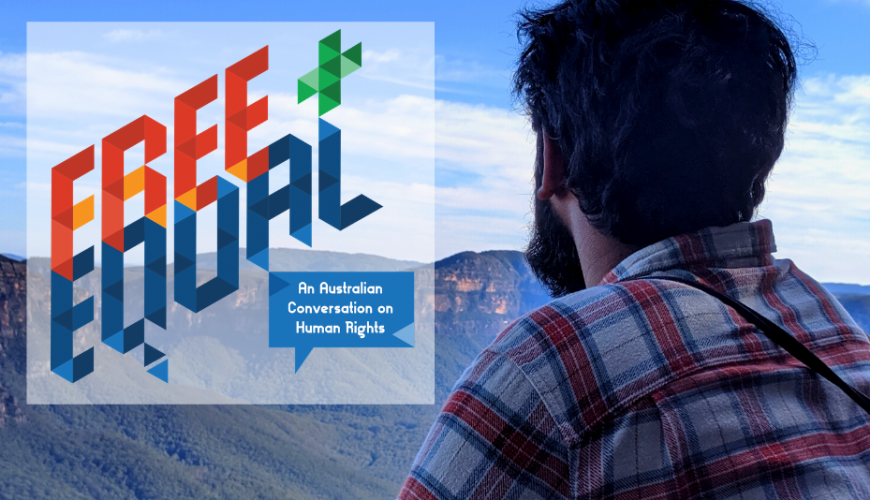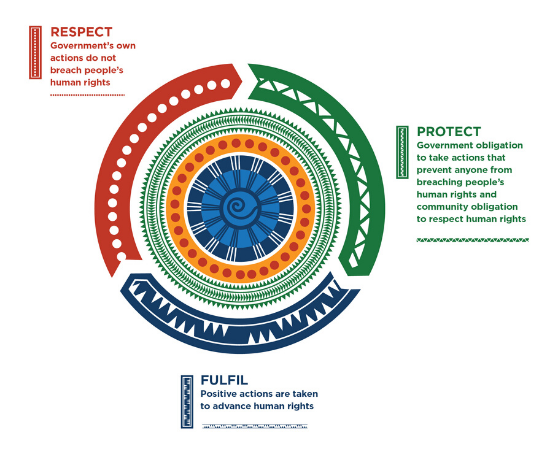Free and Equal: An Australian conversation on human rights

Free and Equal: An Australian Conversation on Human Rights
The Commission’s major, five-year-long project, Free and Equal: An Australian Conversation on Human Rights, proposes a Human Rights Framework to ensure all people are treated with dignity, justice and respect.
Over the five years, the project examined Australia’s existing human rights and anti-discrimination laws, and after extensive research and consultation with government, stakeholder groups and civil society, outlined how the Australian Government can better protect and fulfil human rights.
The proposed Human Rights framework first and foremost benefits ordinary people. It means that all of us, no matter who we are, will have a better understanding of our human rights and will be empowered to take action to get justice when rights have been violated by the government and people that work for it.
Report: Revitalising Australia’s Commitment to Human Rights
The report, Revitalising Australia’s Commitment to Human Rights, is the culmination of the five-year inquiry and proposes a major reset of Australia’s human rights framework, so that the rights of all people can be better understood and properly protected. It sets out a reform agenda to modernise protections and meet the challenges of 21st century life.
The report makes 12 recommendations that focus on large, structural reforms at the national level to be advanced through the introduction of a revitalised National Human Rights Framework. At its heart is a Human Rights Act, a powerful new tool not only to protect ourselves and our communities, but to get justice when governments fail us.
Parliamentary Joint Committee on Human Rights
A new parliamentary report recommending a National Human Rights Act as part of a revitalised Human Rights Framework brings Australia closer than ever before to establishing the basic legal protections that Australians need.
The report, published by the Parliamentary Joint Committee on Human Rights, concludes the Committee’s Inquiry into Australia’s human rights framework. Attorney-General Mark Dreyfus initiated the Inquiry in March 2023, in response to a Position Paper by the Commission, which outlined a model for a National Human Rights Act.
Read the Inquiry into Australia's Human Rights Framework report.

Free+Equal Conference on Human Rights 2024
To mark the conclusion of the five-year project and the parliamentary inquiry, the Commission held a major national conference examining Australia’s human rights framework.
More than 1300 people from across Australia and around the world participated live and online in this landmark event for advancing human rights in Australia.
The Free+Equal Conference featured a diverse line-up of more than 60 eminent experts, thought leaders, social justice advocates and community heroes over 12 engaging sessions and events. Key leaders, experts and advocates gathered to help pave the way for a much-needed overhaul of Australia’s human rights framework, including the introduction of an National Human Rights Act.
This follows on from our first Free+Equal Conference, which was held on Tuesday 8 October 2019 in Sydney. United Nations High Commissioner for Human Rights, Her Excellency Dr Michelle Bachelet AC, delivered the keynote speech where she commented on Australia’s system of human rights protections.
Looking back: How We Got Here
A. Discussion Papers
To kickstart the national conversation back in 2019, the Commission wrote four preliminary papers that explore different parts of our system of human rights protections. One of these papers, the Issues Paper, is more general and looks at our human rights system as a whole.
The Discussion Papers are more technical and lay out specific options for reform of our existing legislative and policy frameworks.
You can read our technical discussion papers here:
- Discussion Paper: Priorities for federal discrimination law reform
- Discussion paper on a model for positive human rights reform in Australia
- Discussion Paper: Ensuring effective national accountability for human rights in PDF (6.1 MB) and here in Word (2.1 MB).
B. Position Papers
Following extensive consultation, the Commission released its two Free and Equal position papers.
The First Free and Equal Position Paper, A Reform Agenda for Federal Discrimination Laws, makes 38 recommendations across four major reform areas:
- Building a preventative culture
- Modernising the regulatory framework
- Enhancing access to justice
- Improving the practical operation of laws
The Second Position Paper, A Human Rights Act for Australia, proposes a model for a national Human Rights Act, how it could function and what it could do.
C. Methodology
Through the project, we spoke to people across the nation to identify what makes an effective system of human rights protection for 21st century Australia, and what steps Australia needs to take to get there.
These were the Terms of Reference (PDF, 164 KB).
The purpose of the National Conversation is to:
- Promote awareness of the importance of human rights to 21st century Australia
- Identify current limitations and barriers to better human rights protections
- Identify what key principles should underpin the reform of human rights in Australia
- Build agreement across the Parliament, government and the community about what we can do collectively to better promote, protect and fulfil human rights
- look at Australia's whole human rights system and how all the pieces fit together.
